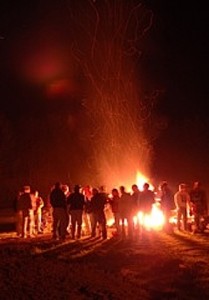 Quinn Ross is one of eight lawyers at The Ross Firm. Quinn practises in the areas of real estate, corporate/commercial law and estate law. He also has broad experience in criminal, administrative and civil litigation where he has appeared before the Ontario Court of Justice, the Ontario Superior Court of Justice, the Divisional Court of Ontario, the Court of Appeal for Ontario and various administrative tribunals.
Quinn Ross is one of eight lawyers at The Ross Firm. Quinn practises in the areas of real estate, corporate/commercial law and estate law. He also has broad experience in criminal, administrative and civil litigation where he has appeared before the Ontario Court of Justice, the Ontario Superior Court of Justice, the Divisional Court of Ontario, the Court of Appeal for Ontario and various administrative tribunals.
***
 Robert Allen offered his mom, Joyce, and her friend, Bob Allard, a deal they didn’t want to refuse…a house complete with fire pit in the back yard, for no rent.
Robert Allen offered his mom, Joyce, and her friend, Bob Allard, a deal they didn’t want to refuse…a house complete with fire pit in the back yard, for no rent.
And so, Robert’s mom and her friend Bobby signed an agreement that said they ”. . . would reside on the property and pay all of the costs therein in lieu of rent.” Sweet.
With that kind of a deal, it’s no wonder Joyce and Bobby decided to throw a July backyard party, complete with a bonfire in the very fire pit the landlord, Robert, had built with his own hands.
It was a grand party. Everyone was having a ball and Bobby kept an eye on the fire with its fancy ring of partially buried cinder blocks around the perimeter of the fire pit.
One of the guests, Lorne Taylor arrived late. It was obvious he had been doing some serious partying earlier that day. He was already drunk. Not to worry. Everything went well for at least half an hour after Lorne arrived, that is, until two girls got into a fight. In the confusion, good old Lorne, already three sheets to the wind, tripped over a partially buried cinder block and landed in the still smoldering fire pit.
So, here is one of those stories we all scratch our heads over.
A guy gets drunk, gets hurt, and then sues everyone around. . . in this case, the tenants, Joyce and Bobby…and get this, he even sues the landlord, Robert, who wasn’t even at the party. Are you kidding me?
I kid you not!
The court assessed Lorne Taylor’s damages at $265,000. So who should pay?
Well, clearly Lorne Taylor should be responsible for some of the damages. He did, after all, show up at the party already drunk.
The Judge who heard the case assessed 50 per cent of the negligence on Lorne himself. That meant that there was still $132,500 for someone else to pay.
The court had no problem in finding the tenants, Nancy and Bobby liable. There were still smoldering embers in the fire pit and those pesky, partially buried cinder blocks were just waiting for someone to trip over.
The Occupiers Liability Act requires occupiers of a property to be responsible for the safety of their guests, sober or otherwise. There was a potential danger here that someone could trip over the cinder blocks and fall into the still hot fire pit. Bobby and Joyce, as the tenants, should have made sure that didn’t happen.
But, what about the landlord, Robert?
Surely the landlord, who gave the property rent free so long as his tenants took proper care of the place, wouldn’t be held responsible. The simple terms of the lease made the tenants responsible for the upkeep of the place. Robert wasn’t even at the party for heaven’s sake.
The Ontario Court of Appeal had a different view of things. It concentrated its laser-like focus on the Landlord and Tenant Act. That Act requires a landlord (Robert in this case) to rent out a property that is safe for human habitation, and those half-buried cinder blocks that Robert installed himself, were clearly unsafe.
The Court went one step further and imposed liability on the landlord under the provisions of the Occupiers Liability Act. It was the landlord who, after all, rented out a property with the unsafe fire pit. It would have been a different story if the tenants had built the fire pit, but they didn’t. Robert, the landlord, created the hazard.
In the end, the tenants, Joyce and Bobby, along with the landlord Robert, split the $132,500.00 damages three ways, or $44,166.67 each.
Lessons to be learned:
1) Know your obligations and rights, whether you are a landlord or a tenant, and particularly if there are special clauses written in the lease. A good law firm can fully explain the fine print.
2) Landlord and Tenant issues are complex. In order to minimize damages, or maximize awards, you need a law firm that can present your side of the story convincingly to a judge.











